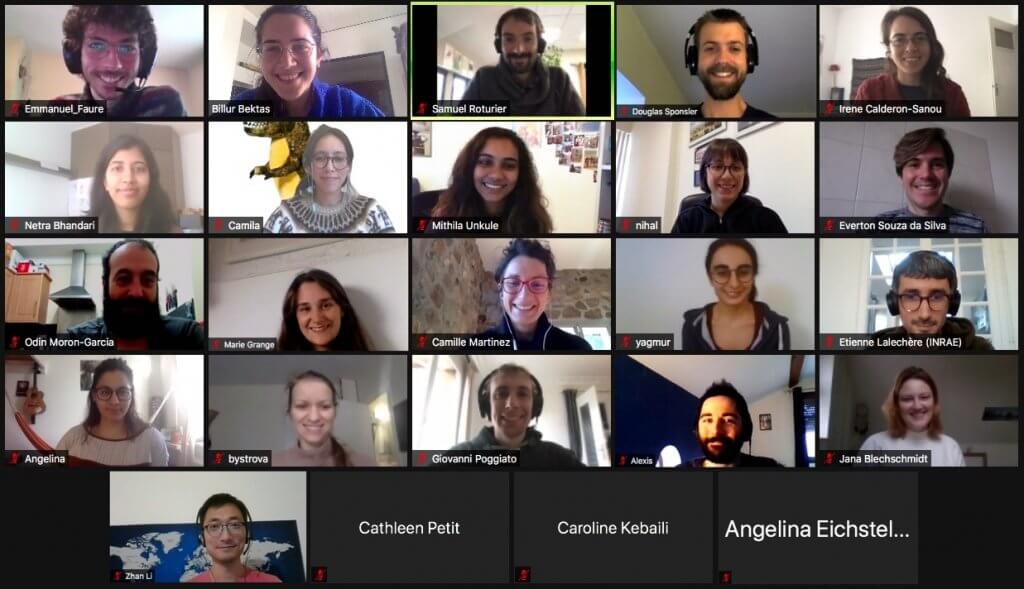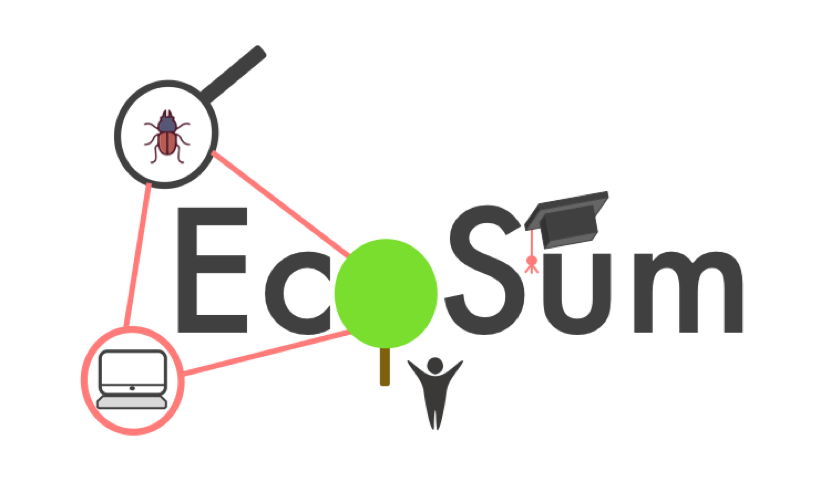This past Autumn I had the opportunity to take part in the EcoSum Initiative Science School. This autumn school is organised by PhD ecology students from the Laboratoire d’Ecologie Alpine (LECA) – a joint research unit that gathers researchers from the Centre National de la Recherche Scientifique (CNRS), the Université Grenoble Alpes and Université Savoie Mont-Blanc, member of the Observatory of Sciences of the Universe of Grenoble (OSUG).
Themed “Ecological Models and Beyond”, the EcoSum Autumn School covers topics since Bayesian inference and ecological networks to evolution and eco-anthropology. As the global pandemic is still on its peak, the school was developed virtually, however, this did not prevent the science school to be a success.
The Virtual Autumn School
The Ecology Autumn School lasted for one week, from November 16th until November 20th, with an average workload of 6 hours per day. In order to make this school virtually, organisers had a great insight in regards to the use of online platforms. Slack was constantly used to make announcements, distribute courses’ materials and messaging between participants. Zoom was the lecture room. While Mural served as the colourful board, where we all could work on and develop ideas. The whole environment of the school was always dynamic, interactive, science-centred and very friendly.
The week started with a very enlightening lecture and R session with Jim Clark (Clark Lab – Duke Trinity College) on Bayesian Inference, followed by a very interesting and dense lecture on process-based modelling and ecology given by Xavier Morim (CEFE – CNRS). Already on Tuesday, we had one of the highlights of the week: the Ecological networks session with Elisa Thébault (IEES Paris – CNRS). This day was very well balanced with lecture in the morning and the practical part in the afternoon. We had the chance to work on different questions in break out rooms, go through the R scripts together, understand the content that was lectured in the morning and present our results. This whole structure made the beginning of the school very exciting!

On Wednesday, we were introduced to Macroevolutionary models by Hélène Morlon (IBENS – Ecole Normale Supérieure) and then we dived into Paleo-biogeography with Ignacio Quintero (IBENS – Ecole Normale Supérieure). It was possible to learn new concepts, definitions, models and databases, besides bringing the linkage between modelling and paleo-biogeography. And who doesn’t like evolution history? Fabien Condamine’s (ISEM – CNRS) session about evolutionary biogeography on Thursday morning was the perfect follow up from Quintero’s lecture of the previous day. We were introduced to hierarchical vicariance models, the Dispersal-Extinction-Cladogenesis (DEC) model and presented empirical case studies.
Thursday also marked the day of the Virtual Roundtable, the event that I was very curious about when I first looked at the program. Beforehand, we had to read a specific paper in preparation for the roundtable. Once we were there, we were divided in groups and we had to discuss among ourselves about the paper, organise our ideas on a board on the Mural platform, and we would get back to the main room for more discussion. The paper was about climate change and ecological restoration. We discussed about issues that can rise from how we express scientific knowledge to the general public, and how sometimes journalism tend to fall on sensationalism, which can cause more issues in certain spheres and practices due to influence and lack of understanding of the scientific aspect. Concomitantly to the discussions, we structured a diagram on how modelling, scientific writing and better communication between science, journalism and general public should be developed to prevent more ecological problems.
After a very productive and interactive Thursday, Friday came bringing a feeling of “I want more” and “I cannot believe this is the last day”, with two very interesting sessions. In the morning with Samuel Roturier (TESS – Univ. Paris Saclay) lecturing about Eco-anthropology, where he presented a practical case of integration between science and society in the Boreal forest, about the science of snow, the Sami people and the process of co-production. Finally, in the afternoon, Adrien Comte (CIRED – AgroParis Tech) did the last lecture of the EcoSum Autumn School 2020, talking about Ecological economics, coral reefs, ecosystem services and climate change.
A Science School to remember!
Even though it was a pity not being able to visit the Grenoble Alpes, the Virtual EcoSum Autumn School was a great experience. Everything was well explained and presented. Regardless of which level of ecological modelling expertise you are, everyone was always helpful and friendly, making this a good introduction to the challenging and, yet, exciting world of modelling. All the activities were well developed, showing how much the organisers took the time to plan and make everything work. And we even had the chance to talk about our personal experiences related to isolation during the covid-19 pandemic. In summary, great content delivered, materials, modelling, knowledge exchange, group work and networking! The 2020 edition marks the beginning of a promising and solid Science School for the EcoSum Initiative Team. And I only have one thing to say: SEE YOU NEXT YEAR!
EcoSum Iniative Website: https://leca.osug.fr/Autumn-School-Ecological-Models










very good thanks